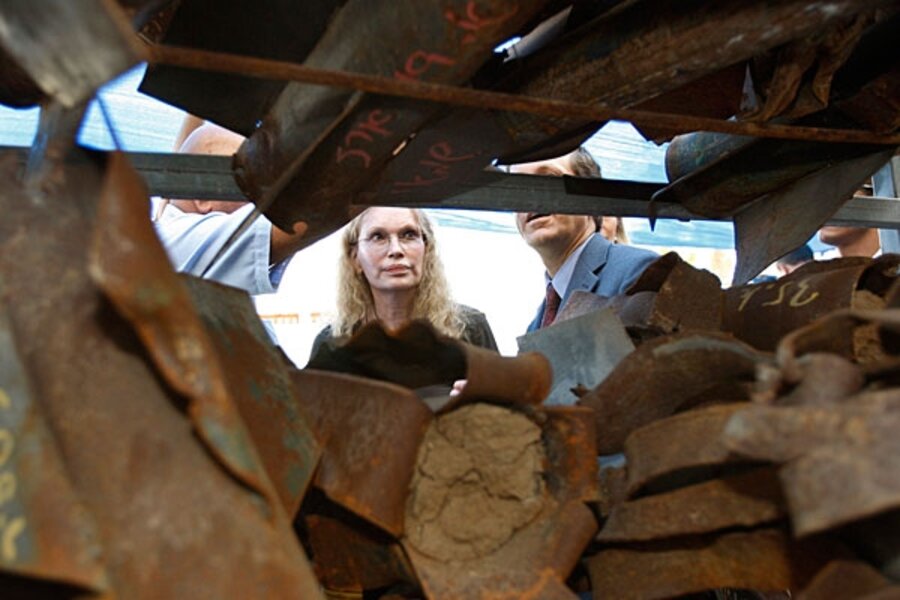Gaza's Plight: A Decade Of Blockade, Hunger, And Despair

Table of Contents
The Humanitarian Crisis: Hunger and Malnutrition in Gaza
Gaza's blockade has severely restricted the flow of essential goods, including food, creating widespread food insecurity and malnutrition. Import restrictions, coupled with the blockade's impact on agriculture and fishing, have decimated the local food supply. This has had a devastating effect on the most vulnerable populations, particularly children.
- Statistics on food insecurity rates in Gaza: The UN estimates that over half of Gaza's population is food insecure, with many families struggling to afford basic necessities. Malnutrition rates, especially among children under five, are alarmingly high.
- Impact on children and vulnerable populations: Malnutrition leads to stunted growth, weakened immune systems, and increased susceptibility to illness. Many children suffer from chronic malnutrition, impacting their physical and cognitive development.
- Challenges faced by farmers and the agricultural sector: The blockade restricts access to essential agricultural inputs like seeds, fertilizers, and pesticides. Movement restrictions also limit farmers' access to their land, impacting productivity and livelihoods. The fishing sector faces similar restrictions, limiting access to fishing grounds and drastically reducing their catch.
- The role of international aid organizations: International aid organizations play a crucial role in providing food assistance to Gaza's vulnerable population. However, aid often falls short of meeting the enormous needs, and the long-term sustainability of aid-based solutions remains a concern. The ongoing need for humanitarian aid underlines the urgent need to address the root cause – Gaza's blockade.
The Crumbling Healthcare System in Gaza: A Consequence of the Blockade
Gaza's already fragile healthcare system has been crippled by the blockade. Restrictions on the import of essential medicines, medical equipment, and supplies have created a critical shortage, severely impacting the quality of healthcare available to the population.
- Shortage of essential medicines and medical equipment: Many life-saving medications are unavailable or in critically short supply, forcing healthcare professionals to make difficult choices about who receives treatment.
- Limited access to specialized medical care: The blockade limits the ability of patients to access specialized treatment outside of Gaza, often resulting in delayed or inadequate care for serious illnesses.
- Strain on hospital resources and staff due to high demand and limited supplies: Hospitals are constantly overcrowded, understaffed, and lacking essential resources. Healthcare workers operate under immense pressure, facing ethical dilemmas and burnout.
- Impact on maternal and child health: The shortage of essential medicines and equipment significantly increases maternal and infant mortality rates, highlighting the devastating consequences of the blockade on the most vulnerable members of society. Many pregnant women and newborns face life-threatening complications due to inadequate care.
Economic Devastation and Unemployment in Gaza: A Cycle of Despair
The blockade has strangled Gaza's economy, leading to widespread unemployment and poverty. The restrictions on movement, trade, and access to resources have crippled businesses and prevented economic development.
- Statistics on unemployment rates, particularly among young people: Unemployment rates in Gaza are among the highest in the world, with youth unemployment exceeding 60%. This lack of opportunities fuels despair and social unrest.
- Impact on small businesses and the private sector: The blockade has severely restricted the ability of small businesses to operate and thrive, resulting in widespread business closures and job losses. The lack of access to raw materials and markets stifles economic growth.
- Limited opportunities for economic growth and development: The blockade has created a vicious cycle of poverty and unemployment, limiting opportunities for education and economic advancement. This lack of hope fuels desperation and undermines social stability.
- The role of the blockade in perpetuating poverty and inequality: The blockade is a primary driver of poverty and inequality in Gaza, exacerbating existing social and economic disparities.
Psychological Impact and Mental Health Challenges in Gaza
The ongoing blockade has had a devastating impact on the mental health of the Gazan population. Years of conflict, hardship, and uncertainty have contributed to high rates of PTSD, depression, anxiety, and other mental health disorders.
- High rates of PTSD, depression, and anxiety: The constant threat of violence, poverty, and uncertainty takes a significant toll on mental wellbeing, leading to widespread psychological distress.
- Limited access to mental healthcare services: The already strained healthcare system struggles to provide adequate mental healthcare services, leaving many in need of support without access.
- The impact of repeated conflict and violence on mental wellbeing: The recurring cycles of conflict and violence inflict deep psychological trauma, leading to long-term mental health challenges for many Gazans.
- The importance of addressing mental health needs in the context of humanitarian crises: Addressing the mental health needs of the Gazan population is crucial for long-term recovery and stability. Integrating mental health services into broader humanitarian aid is essential.
Conclusion: Breaking the Siege on Gaza
Gaza's blockade is not merely a humanitarian crisis; it is a systematic dismantling of a society. The consequences—widespread hunger, a crumbling healthcare system, economic devastation, and a profound psychological toll—are undeniable. The international community must recognize the urgency of the situation and take decisive action to end Gaza's blockade. We must work to break the siege on Gaza, providing immediate humanitarian aid while simultaneously advocating for lasting political solutions that guarantee the human rights and well-being of the Gazan people. Support organizations working to alleviate suffering in Gaza and demand an end to the blockade. Visit [link to relevant organization 1] and [link to relevant organization 2] to learn more and take action. Let's collectively strive to #EndGazasBlockade and build a future of hope and dignity for the people of Gaza.

Featured Posts
-
 How Much Is Adam Sandler Worth A Look At The Comedians Impressive Fortune
May 11, 2025
How Much Is Adam Sandler Worth A Look At The Comedians Impressive Fortune
May 11, 2025 -
 The Hotel Transylvania Universe Movies Shows And Games
May 11, 2025
The Hotel Transylvania Universe Movies Shows And Games
May 11, 2025 -
 Omada Healths Us Ipo A Look At The Andreessen Horowitz Investment
May 11, 2025
Omada Healths Us Ipo A Look At The Andreessen Horowitz Investment
May 11, 2025 -
 Budget Serre 12 Astuces Pour Faire Des Economies
May 11, 2025
Budget Serre 12 Astuces Pour Faire Des Economies
May 11, 2025 -
 Payton Pritchards Impact A Pivotal Role In Celtics Game 1 Playoff Victory
May 11, 2025
Payton Pritchards Impact A Pivotal Role In Celtics Game 1 Playoff Victory
May 11, 2025
